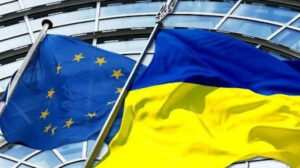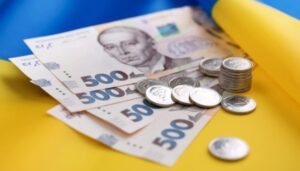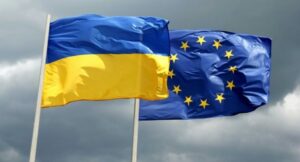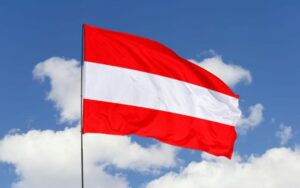
The EU will provide Ukraine with €35 billion in financial support in 2025, European Commission Vice President Valdis Dombrovskis said on Platform X on Wednesday evening.
“The EU is providing Ukraine with financial support through the G7 ERA credit initiative and the Ukraine Facility in the amount of €35 billion for 2025,” Dombrovskis wrote.

In 2025, the Food and Agriculture Organization of the United Nations (FAO) will continue to support Ukrainian farmers in Kherson region by providing them with equipment for loading/unloading grain storage sleeves and coordinating soil testing, said Vitaliy Koval, Minister of Agrarian Policy and Food.
“In 2025, FAO is focusing on the transformation of the agricultural sector and its urgent needs. Therefore, we agreed to transfer equipment for loading/unloading sleeves for farmers in the Kherson region. He also emphasized the importance of further support for farmers in the frontline areas. In addition, we will coordinate soil analysis after demining together. We need to ensure that such land is safe and can be used for sowing. Food security directly depends on this,” the press service of the Ministry of Agrarian Policy and Food quoted him as saying at a meeting with the acting head of the FAO Office in Ukraine, Mohammed Azuka.
The minister noted that another area of cooperation with FAO would be the State Agrarian Register.
Vitalii Koval and Mohammed Azuka signed a project document entitled “Saving livelihoods by supporting small wine producers through the Food Coalition”. The project aims to create a favorable environment for small wine producers in Odesa and Zakarpattia regions. It is about providing them with technical support, access to finance to recover from the effects of the war and the decline in vineyard productivity, and to increase production.

The Food and Agriculture Organization of the United Nations (FAO) has announced a project strategy to support small farmers in a number of frontline regions and will provide them with $1,000 vouchers to purchase grain seeds for the upcoming spring and autumn sowing campaigns, the FAO press service reports.
“FAO is committed to empowering farmers to rebuild and sustain their livelihoods by providing access to quality agricultural inputs, strengthening local economies and promoting the long-term resilience of war-affected communities,” the statement said.
The initiative is funded by the governments of Germany and France. It is expected to be an important step in restoring agricultural production and strengthening the food security of communities affected by the ongoing war.
The program will be open to 550 small and medium-sized farmers who cultivate land plots ranging from 10 to 300 hectares in Chernihiv, Donetsk, Kherson, Odesa and Zaporizhzhia regions. Priority will be given to farms run by women and those operating near the frontline, where farming conditions remain difficult.
Farmers interested in participating can apply for assistance through the State Agrarian Register (SAR) until January 26, 2025. After the applications are processed, selected participants will receive confirmation through the SAR, as well as detailed information on how to receive and use the vouchers.
FAO noted that applying does not guarantee assistance, as eligibility will be determined based on specific program criteria.

In 2024, Ukraine received $41.7 billion in external financing to cover the budget deficit, which made it possible to allocate the necessary funds to repel full-scale Russian aggression, Finance Minister Sergii Marchenko said.
“This makes it possible to fully finance pensions, salaries in education and healthcare, and the entire humanitarian and social system,” the Finance Minister said during a national telethon on Monday.
He noted that this year and next year, Ukraine will allocate UAH 2.2 trillion ($52.5 billion at the current exchange rate), or 26% of GDP, to the security and defense sector.
Regarding budget financing for 2025, which is planned in the state budget at $38.4 billion, Marchenko emphasized the importance of implementing the G7’s ERA initiative to allocate $50 billion to Ukraine from frozen Russian assets.
“We have access to $50 billion, which allows us to look forward to 2025 with confidence. Moreover, if everything goes well, we plan to close 2026 and 2027 with the help of these assets,” the Finance Minister said.
He clarified that in 2024, the state budget has already received the first $1 billion of this $50 billion from the United States.
In general, assessing Ukraine’s dependence on external financing, Marchenko believes that “if we end the war, such dependence will not be glaring.” The minister reiterated that the huge budget deficit is due to the cost of the war.

YouGov poll shows that ending the war with Russia through negotiations is the preferred option in four out of seven countries
Willingness to support Ukraine “until victory” has fallen sharply in Western Europe at a critical time, according to a poll, as Donald Trump’s impending return to the White House raises questions about the future of US military aid to Kyiv.
A December YouGov poll in France, Germany, Italy, Spain, Sweden, Denmark and the UK found that public willingness to support Ukraine to victory – even if it means prolonging the war – has declined sharply in all seven countries over the past 12 months.
Support for an alternative solution to the conflict – a negotiated end to hostilities, even if it would leave Russia in control of parts of Ukraine – has increased in every country, the poll found, and in four of them this option is the most desirable.
There was some dissatisfaction with the idea of an imposed settlement that would involve Ukraine ceding part of its territory to Russia, as well as a widespread belief that the new US president would leave Ukraine after his inauguration on January 20.
Trump boasted, without providing details, that he could end the war “in 24 hours,” and his ambassador to Ukraine, Keith Kellogg, is scheduled to visit European capitals in early January. Analysts express doubts that Russian President Vladimir Putin will negotiate on terms acceptable to Kyiv.
Ukrainian President Volodymyr Zelenskyy welcomed Trump’s victory amid frustration with the outgoing Biden administration’s gradualist policies and ‘escalation management’ strategy.
The news comes almost three years after Putin’s full-scale invasion and at a critical time for Ukraine. This year, Russia has advanced at its fastest pace since the spring of 2022, when its columns made an unsuccessful attempt to seize Kyiv.
Russian troops have seized several towns in eastern Donbas, and Ukraine’s armed forces are struggling to defend populated areas in the face of a lack of forward forces and Russia’s continued military superiority.
Kyiv acknowledges that the Kremlin’s tactics have been effective, including the use of aircraft to strike defensive positions with glider bombs, followed by artillery shelling and small infantry groups. Russia is also adept at identifying weak Ukrainian brigades.
The poll showed that the willingness to support Ukraine until it defeats Russia remains high in Sweden (50%) and Denmark (40%), and in the UK (36%), but these levels are down 14 points from January’s 57%, 51% and 50%.
During the same period, the percentage of those who prefer a negotiated peace increased to 55% from 45% in Italy, 46% (38%) in Spain, 43% (35%) in France, and 45% (38%) in Germany, accompanied by a corresponding drop in willingness to support Ukraine until it wins.
It was unclear whether this change reflected a decline in interest or growing fatigue. In France, Germany, and Sweden, the share of those who want Ukraine to win – and are rooting for it to win – has remained stable since early 2023, although it has declined in other countries.
Less than a month before Trump’s return, a majority or near-majority in all but one country considered it likely that the newly elected US president would stop supporting Ukraine: 62% of Germans, 60% of Spaniards, 56% of Britons, 52% of French, and 48% of Italians.
They were less confident that Trump would withdraw the United States from the NATO defense alliance: Danes, Germans, Italians, Spaniards, and Swedes were more likely to believe that this would not happen, while the British and French were evenly divided.
People are also split on how they feel about a peaceful settlement that would leave Russia in control of at least some of the parts of Ukraine it illegally seized after invading in February 2022, as Trump reportedly may be planning.
Majorities in Sweden (57%), Denmark (53%), and the United Kingdom (51%), as well as a significant minority (43%) in Spain, said they would have a very or somewhat negative attitude toward such a deal, compared to only 37% in France and 31% in Germany and Italy.
It is unclear how any deal on Ukraine could be concluded. Last week, Putin reaffirmed his maximalist goals, including Russian control of Crimea and the four “annexed” Ukrainian regions, as well as the demilitarization of Ukraine and a veto on its NATO membership.
Zelenskyy is unwilling to hand over the occupied territories to Russia. NATO Secretary General Mark Rutte criticized Western talk of a peace process as premature, saying that Ukraine must get what it needs to stop Putin’s victory.
The poll showed that most Westerners believe that Ukraine’s allies are not doing enough, both in terms of economic sanctions against Moscow and military and other assistance to Kyiv, to prevent Russia from winning the war.
About 66% of Danes, 63% of Swedes and Spaniards, 59% of Britons, 53% of Germans and Italians, and 52% of French said that overall assistance to Ukraine was either insufficient or almost insufficient. However, few believe that their country should increase support.
A minority – ranging from 29% in Sweden to 21% in the UK and Germany, to 14% in France and only 11% in Italy – believed that their government should increase aid to Ukraine, with a larger share of respondents in each country saying it should either be maintained or reduced.
When it came to specific measures, such as strengthening sanctions, supplying more weapons, sending more troops to support NATO members in Eastern Europe, or coordinating airstrikes against Russian targets in Ukraine, support was stable or lower than before.
When asked what they thought the situation would be like in a year’s time, few Western Europeans believed that either Russia or Ukraine would win, with most believing that both countries would either continue to fight or reach a peaceful settlement.
A settlement was seen as more likely in Denmark (47%), Germany (40%), the United Kingdom and France (38%), and Italy (36%), while continued fighting was seen as a slightly more likely scenario in Spain (36%) and Sweden (35%).
Source: https://www.theguardian.com/world/2024/dec/26/support-for-ukraine-russia-war-yougov-poll-survey

Austria has pledged to provide additional humanitarian support to Ukraine in the amount of EUR 8 million and will also provide EUR 2 million for the Ukrainian initiative Grain from Ukraine, Austrian Foreign Minister Alexander Schallenberg said.
“And today I can announce that we have committed to provide additional humanitarian support to Ukraine in the amount of EUR8 million: EUR5 million for the World Food Programme’s mine action program and EUR3 million for humanitarian assistance through international organizations working in Ukraine and Moldova,” said Schallenberg at a joint press conference with his Ukrainian counterpart Andriy Sibiga on Wednesday.
He also announced the allocation of additional funds for the Grain from Ukraine initiative.
“And I am pleased to announce that we will provide EUR2 million in addition to the EUR2 million allocated by the Austrian Development Agency for the Grain from Ukraine initiative, which I believe is important to reduce the impact of Putin’s war on global food security,” the minister said.
The foreign minister noted that at the bilateral level alone, his country provided EUR264 million in support to Ukraine, which was directed to humanitarian and financial assistance.